Summary 
Outdoor romance with mature protagonists - Petruchio a grizzled veteran looking to settle down, Kate an uptight bookworm seeking affection - plays more as a sophisticated comedy of manners than a rough-and-tumble battle of the sexes. Intelligently directed and engagingly played, an entertaining and well-costumed production that eschews taming of a spouse for the realization of mutual affection.
Design
Directed by Tim Ocel. Costumes by B. Modern. Set by Andrew Boyce. Lights by Michael A. Peterson. Sound and original music by Joe Cerqua.
Cast
John Pribyl (Baptista), Tracy Michelle Arnold (Katherine), Ashleigh LaThrop (Bianca), James Ridge (Petruchio), David Daniel (Grumio), Travis A. Knight (Curtis), Brian Mani (Vincentio), Eric Parks (Lucentio), Matt Schwader (Tranio), Charlie Wright (Biondello), Jonathan Smoots (Gremio), LaShawn Banks (Hortensio), Greta Wohlrabe (Widow/Haberdasher).
Analysis
Director Tim Ocel's production of The Taming of the Shrew is staged in the Up the Hill ampitheater at American Players Theatre, a charming outdoor space within southern Wisconsin woods. Ocel cuts the Christopher Sly play-within-a-play Induction, giving more focus to the role-reversal shenanigans of Lucentio and Tranio in a kind of comedy of manners that brings to mind Shaw and Wodehouse and Coward. Shakespeare's protagonist, a grizzled war veteran Petruchio with a crusty shoot-from-the-hip approach, is something of a shrew himself, needing to be tamed into the genteel world of post-war Italy.
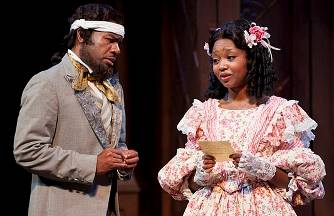
Ocel begins 1.1 with Tranio, well-played by Matt Schwader as a quick-witted manservant - in white gloves, top hat and tails - initially out of his element in wide-eyed and high-pitched hysteria, gradually becoming acclimated within his high-brow deception. He and Lucentio toss away text books one by one with rising disgust for academia, deciding to join the much older Hortensio and Gremio in their spats and tuxedo coats and long-shot pursuit of Bianca. Schwader's Tranio responds with aw-shucks awkwardness to his master's thankful embrace, but moments later is adding his own suitcase to an overloaded Biondello and leading the journey to Padua, where he offers a business card and suavely lets it fall. The older gentlemen are already in awe of Baptista's youngest daughter, Bianca, a cooing but for the most part silent ingénue twirling a parasol and wearing a ruffled pink dress with long gloves. Their reaction to Katherine is diametrically opposite, Gremio trying to defend himself from "this fiend of hell" with his cane.
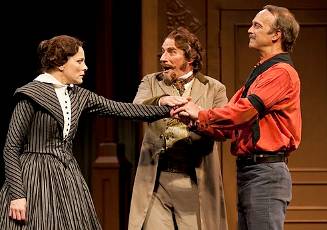
James Ridge's Petruchio arrives 1.2 as a mustached war veteran in a long-sleeved red shirt and well-worn boots, wearing a hat and a scarf and looking like an officer in a ragtag Italian mercenary outfit. The costumes evoke the late nineteenth or early twentieth century, the servant Grumio brandishing an old rifle with a bayonet attached, tossing a canteen back and forth with his master to accent their verbal banter. When the fiery Petruchio weathers an insult, Grumio must restrain him from assaulting the old gray-haired Baptista. Ridge's rugged war hero seems to be well-off financially but is looking to immerse himself into upper-crust society with his selection of a wife. When Katherine appears in the next scene, 2.1, she has the faraway gaze of a dreamer and the firmly set jaw of the emotionally abused, as she seems to be disregarded and minimalized by Baptista in favor of the coquettish Bianca. When she matter-of-factedly hog-ties a whimpering Bianca, her venom and anger do not seem directed at her sister but toward her offstage father. Looking much the bookworm schoolmarm, Katherine roughs up the servants as well as Baptista in her cyclone fury, scolding her father - "she is your treasure" - and appearing shocked: "you call me daughter?"
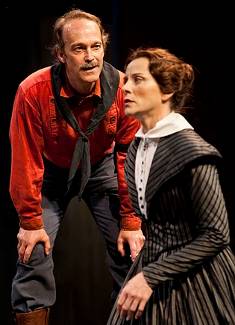
The central confrontation - after the exit of Hortensio, holding his broken lute, a bloody bandage on his forehead - plays as a love-at-first-fight meet cute, Ridge's Petruchio stunned and fixing his hair downstage, and Tracy Michelle Arnold's Kate becoming more and more smitten with the wooing iconoclast who can match her acerbic wit and maturity. The back-and-forth verbal fireworks subside for a moment, and Petruchio pauses to light a cigarette before pursuing a kiss and leading Kate offstage through a throng of astonished witnesses. Gremio receives a bemused laugh - "he hath got a quiet catch" - as Baptista begins to giggle almost hysterically at the unheard-of notion of Katherine being wed.
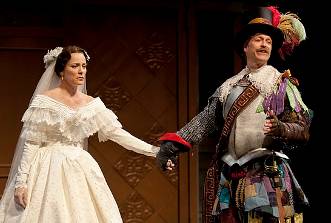
After a brief wooing scene - Hortensio angrily tuning his guitar while in-disguise Lucentio flirts with Bianca upstage - Ocel punctuates the production's first half with the 3.1 wedding day. Ridge's Petruchio arrives for his nuptials dressed like a drunken conquistador, wearing an armored breast plate, two different-colored gloves, and feathers protruding from a top hat. His defiance of social norms - "to me she is married, not unto my clothes" - brings the intermission. Ocel's second act begins 4.1 in Petruchio's grubby household, with six grimy ex-military servants making revelatory remarks - "he is more shrew than she" - as the bewildered and bedraggled Kate arrives in her now filthy white wedding gown. Ridge's Petruchio shows off his home for Kate, scrawling "welcome sweet wife!" on a blackboard but slamming the table and crying "food! food! food!" His anger seems to erupt in part from embarrassment over his dwelling, and he demands his boots be removed, then flings a slipper at a servant who stumbles. He shrewishly tosses food and dishes and utensils all over the stage in a psychotic affront, but moments later he calmly emerges in a blue-belted bath robe, confiding to the audience his plan, revealing regret rather than delight, and he exits with world-weary sadness.
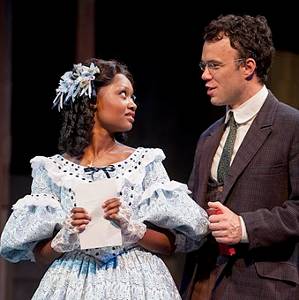
Ocel presents 4.2 and 4.3 as parlor-comedy bookends, first Tranio conning an elderly hobo into impersonating Lucentio's wealthy father as Bianca cavorts in a ribbon-covered light-blue dress and fingerless gloves. Matching the scene is a green-dressed haberdasher and a ghoulish tailor presenting a hat and gown for Katherine that Petruchio of course condemns. After making his intentions quite clear to Kate - "when you are gentle, you will have one, too, and not till then" - he lies on his stomach upon the table next to her, his chin in his hands, cajoling her, but clearly enamored himself. The 4.5 exchange over the sun and the moon presents Arnold's Kate at both her breaking point and her reckoning, as she grows increasingly exasperated. Ridge's Petruchio, in a bath-robe with boots and a cowboy hat, sits with his ankles crossed, insistent and persistent, and he addresses a passing old man as "gentle mistress." When Kate refers with similar earnestness to the gentleman as "young budding virgin," Petruchio and his servants break into wild laughter, not so much at Kate's "taming" but at her getting the joke. When they finally resume their travels, she moves close to Ridge's Petruchio and takes him gently by the hand.
Ocel begins the Act V conclusion with the comeuppance of the servants, Schwader's Tranio stealing the scene with a schoolgirl scream that is matched by Bianca's squeal of delight at her engagement ring. Kate and Petruchio witness the tying up of loose plot ends from downstage, then turn to smile at each other and gently kiss as Tranio returns, again the ever-efficient butler in white gloves, orchestrating a scene change and the movement of much furniture. The parlor scene features a downstage grandfather's clock, a sofa facing away from the audience, and an ornate area rug beneath a banquet table. In mock confusion, Schwader's Tranio consults a blueprint with his crew, who discover their error - the plan was, pointedly, upside down, perhaps like Petruchio's taming of Kate - then hurry to reverse and rearrange the set, the sofa now upstage next to the clock opposite winged armchairs and ottomans, to a burst of spontaneous applause from the audience.
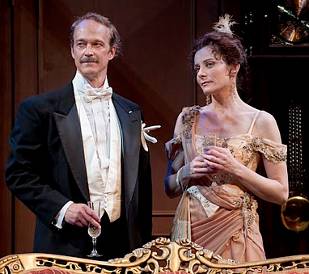
When Ridge's Petruchio enters in 5.2, he appears as tamed as his new bride, and he stands debonair in a tuxedo beside Kate in a gown with gloves, her hair up as she poses with a champagne flute. His decidedly problematic wager over wifely obedience is made as a "command," but Arnold's Kate calmly - and surprisingly - complies, then turns to fetch the other brides as per Petruchio's wish. She delivers the concluding speech about wifely duty, obedience, and gratitude, and Ridge's Petruchio appears truly moved. When Arnold's Kate kneels and places her hand on the ground - "my hand is ready" - for him to tread upon, Ridge's Petruchio kneels as well, lifting her hand, then kissing Kate and caressing her cheek. While it may play as something of an apologetic reach, Ocel and his performers manage to present a mature romance a la Much Ado About Nothing, with two seasoned and witty protagonists convincingly finding late but enduring - and mutual - love and respect.